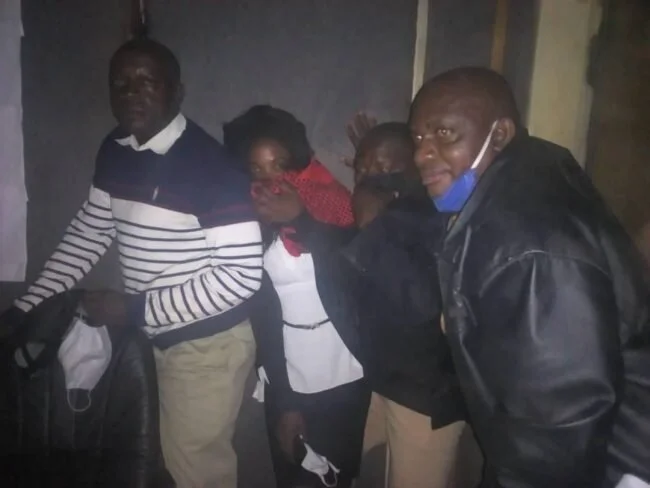Something Is Rotten In The State Of Zambia
As youth groups across the country prepare to take to the streets this weekend, protesting against the decision to scrap the 2016 voter roll, the rot at the heart of Zambia’s democracy becomes even harder to ignore. For months now the government has made precise and deliberate efforts to undermine the country’s democratic institutions: adapting the constitution, disenfranchising voters, and hamstringing opposition leaders. All with the concerted aim of stealing the 2021 general election. While political corruption is nothing new in Zambia, this subtle and multifaceted assault could be the most dangerous threat to Zambian democracy since the end of the one-party state
UPND protestors demonstrating against the ECZ in the bush around Chipata this week.
Key to this assault are the disastrous changes to the constitution outlined in Bill 10. If enacted, these amendments would introduce the possibility of coalition government in the event that no single party attains more than 50% of the vote. This is undoubtedly good news for President Lungu, who won the 2016 presidential election with just 50.3% of the vote and is widely predicted to do worse this time around.
The bill also allows ministers to remain in office during the election period and provides presidential oversight in the appointment of judges - all of which makes it easier for the PF to hang on to power in the event of an inconclusive vote.
Then there is the matter of the electoral register. On 21 September the Electoral Commission of Zambia (ECZ) announced it would be scrapping the 2016 voter roll - despite using the same document to hold parliamentary and local government by-elections just days before. The 6 million person register will be replaced, the commission claims, by a roll of some 9 million newly registered voters - approximately the entire adult population of Zambia. As though this wasn’t ambitious enough, the ECZ has also committed to completing the entire exercise in just one month, starting on October 28th.
The very idea of registering 9 million Zambians in one month is not only ludicrous, but profoundly corrupt. In scrapping the 2016 register the ECZ will potentially disenfranchise millions of Zambians; particularly in rural areas where voters will struggle to reach administrative centres in time to reregister. All this plays into the hands of the PF once more, who not only draw the majority of their support from urban areas, but who have historically thrived in constituencies with poor voter turnout.
Musician and civil rights activist Pilato after his case against the ECZ was thrown out of the Lusaka High Court.
This act of mass disenfranchisement is in fact so blatant that the ECZ has already been taken to court over it - twice. Predictably enough the UPND’s case against the commission has been adjourned indefinitely. Meanwhile the case spearheaded by musician and civil rights campaigner Pilato was thrown out of the Lusaka High Court last week for bearing too much similarity to the UPND’s.
All this is to say nothing of the plethora of far less subtle tactics the government has used to batter Zambia’s democracy in recent months. From attacks on local radio stations by PF cadres; to accusations of ballot stuffing at the Lukashya by-election; to the effective censorship of Prime TV and the privatization witch-hunt against Hakainde Hichilema, the government has exploited every possible avenue to curtail free speech and kneecap its opposition.
These methods are merely blunt instruments however, compared to the razor-like incisions threatened by Bill 10, the voter roll scandal and the ongoing legal chicanery. The attacks made on the 2021 elections have the power to permanently undermine Zambia’s democracy; potentially allowing a minority government to rule over Zambia with a fraction of the popular vote for decades. The protests planned for this weekend show that the country is beginning to wake up to the reality of these threats, but action cannot come soon enough.
Staff at Isoka FM hiding from PF attackers in May 2020.



